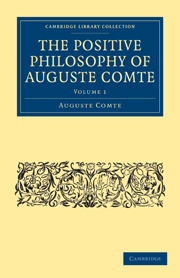CHAPTER I
Published online by Cambridge University Press: 29 August 2010
Summary
Its nature
We have now to review the last of the sciences which relate to the inorganic world. Chemistry has for its object the modifications that all substances may undergo in their composition in virtue of their molecular reactions. Without this new order of phenomena, the most important operations of terrestrial nature would be incomprehensible to us; and there is no other class of phenomena so intimate and so complex. Inert bodies can never appear so nearly like vital ones as when they produce in each other those rapid and profound perturbations which characterize chemical effects. We shall see hereafter that the spirit of all theological and metaphysical philosophy consists in conceiving of all phenomena as analogous to the only one which is known by immediate consciousness,—Life : and we can easily understand that the primitive method of philosophizing must have exerted a more powerful and obstinate dominion over chemical phenomena than any other, in the inorganic world.—We must consider, too, that direct and spontaneous observation must have been applied in the first place only to very complicated phenomena, such as vegetable combustions, fermentations, etc., the analysis of which now requires all the resources of our science: and that the most important chemical phenomena are produced only in artificial circumstances, which were long in being devised, and very difficult at first to institute.
- Type
- Chapter
- Information
- The Positive Philosophy of Auguste Comte , pp. 289 - 307Publisher: Cambridge University PressPrint publication year: 2009First published in: 1853

